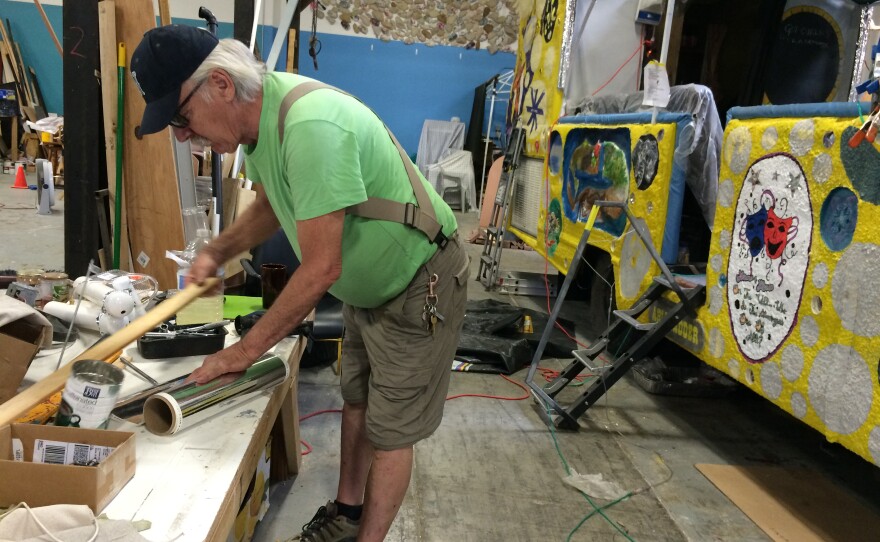The week-long Burning Man arts festival is underway in Black Rock Desert about two hours north of Reno. While attendees stock up on water and ice, a theme camp for the physically impaired teaches a different kind of self-reliance. As Reno Public Radio's Julia Ritchey reports, accessibility issues are often overlooked by the larger Burning Man community.
"I'm working on ‘The Babe,’ and ‘The Babe’ is an art car for the mobility challenged. It has its own wheelchair lift, which is unique, it'll be the only one on the playa this year, but hoping they'll be more..."
That's Tim Kelly. He's 70 years old, has lung disease and takes a portable oxygen tank wherever he goes, even the Black Rock Desert.
Kelly has only been twice to Burning Man, but says seeing other physically impaired people struggle on the playa gave him the motivation to build “The Babe” this year.
The base of the car is an old motor home he bought off Craigslist, and he’s financed most of the project himself using recycled materials.
"And we have a toilet,” he says. “And we have a shower, which is, you know, that's a plus."
Kelly participates in a group called Mobility Camp at Burning Man. About 40-50 people camp there each year, in addition to caregivers and the so-called walking wounded, those who become injured over the course of the week.
"The playa is one of the least wheelchair friendly environments on the planet. The super fine alkali dust eats electronics for lunch," says Dani Moore, a.k.a. Rat Lady, who’s run the camp since 2012.
Because she uses a wheelchair, she says for years her friends discouraged her from attending the festival. But about five years ago, when a friend lost his license, he asked her for a lift and she agreed, deciding to take the risk.
"I honestly don't think anyone out on the playa excludes the disabled on purpose,” she says. “I think it's just that for so long there's been this perception that there aren't disabled people at Burning Man because you couldn't possibly do Burning Man in a wheelchair."
Mobility Camp is located in the center of Burning Man's concentric layout. It’s connected to the power grid to charge equipment like motorized chairs, oxygen concentrators and C-Pap machines.
"Our camp motto is radical inclusion through radical accessibility,” says Moore.
This is just the most recent iteration of the camp. Around 2000, Dale Huntsman, a longtime Burning Man attendee, founded Hot Wheelz Camp after seeing a woman on a bike struggling to pull her partner in a wheelchair.
"Burning Man is a gift-based economy and our gift was going to be and continues to be the gift of mobility," he says.
Huntsman and his friends retrofitted old golf carts and motorized wheelchairs, decorating them with fur and leather to give them a playful appearance to blend in with other art cars.
"The attention should be on the person, not the disability,” he says. “And so the uniqueness of their vehicle makes them a unique person, but you don't really see their disability because you don't see that they're sitting in an invalid-assistance vehicle."
Huntsman ran the program for about six years until handing it over to another volunteer. With a cost of about $4,000 each year to operate, the Mobility Camp relies on dues and donations to keep it going.
"My passion is that no one else waste 15 years listening to people who don't know say, ‘You can't go to Burning Man because you're in a wheelchair,’" says Moore.
Moore is holding a workshop this week for camps and artists to learn simple things they can do in the planning stages to make Burning Man festivities just a little more accessible and wheelchair friendly.
"We are slowly seeing things out on the playa becoming a little more accessible, and that's wonderful,” she says. “We'd like to see a lot more of that."
With more burners from the Baby Boomer generation showing signs of their age, Moore thinks radical accessibility will become an even hotter topic in Burning Mans to come.






